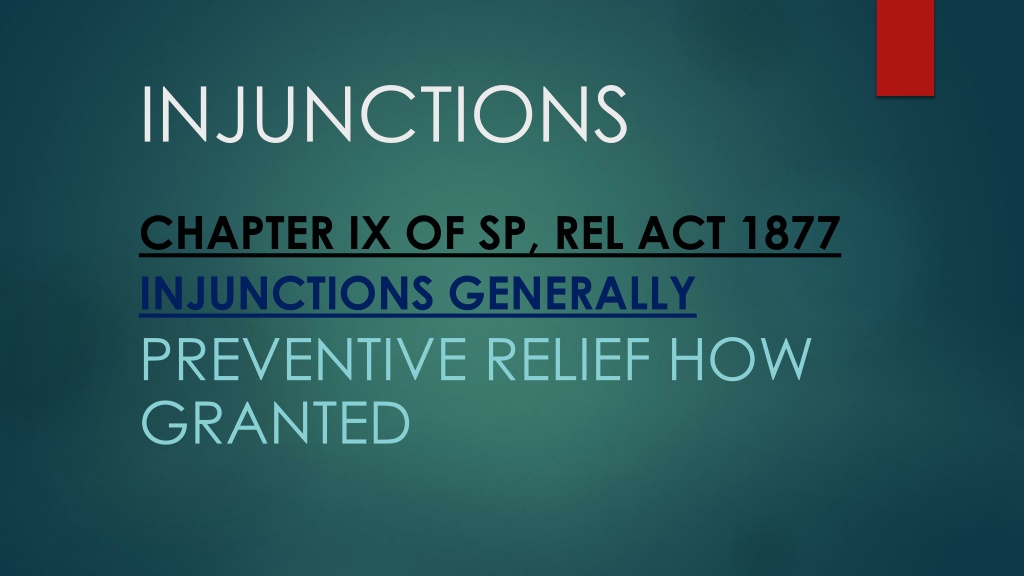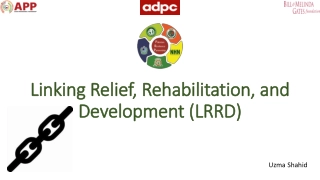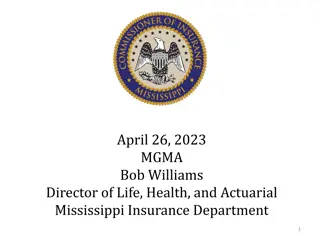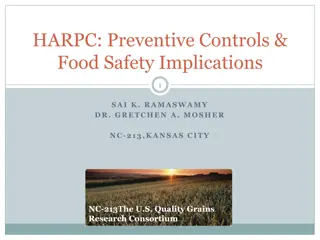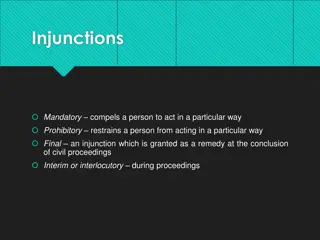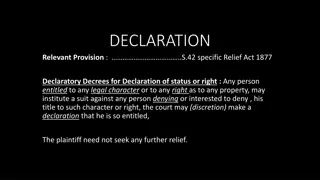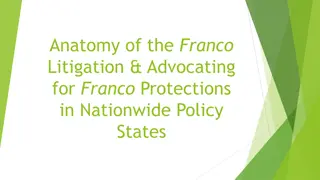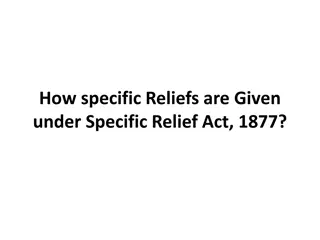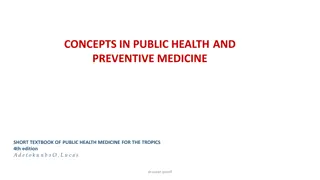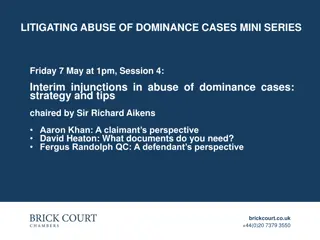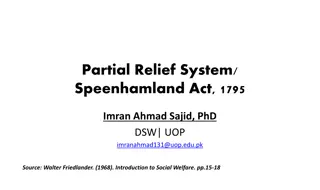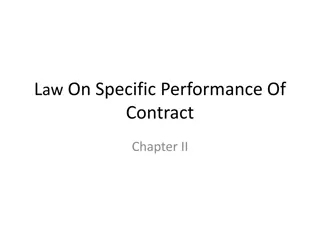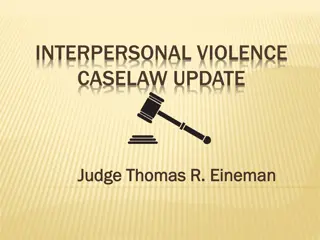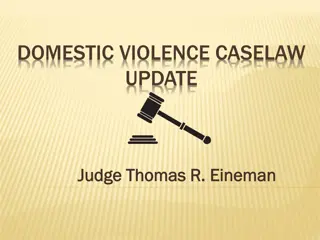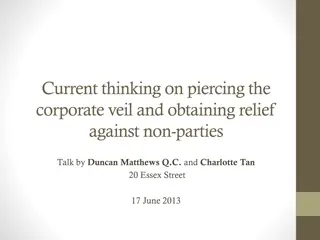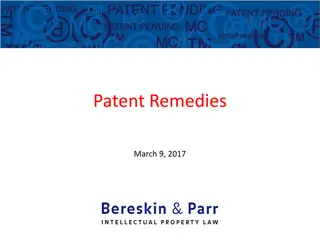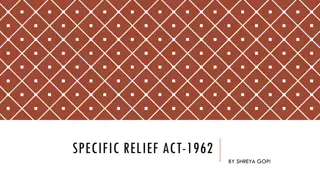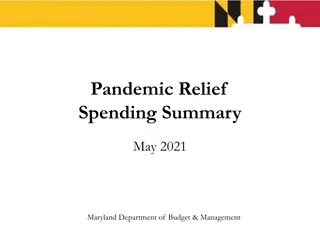Understanding Preventive Relief Through Injunctions in the 1877 Specific Relief Act
Injunctions are a vital judicial remedy to prevent parties from engaging in certain activities. The 1877 Specific Relief Act outlines the granting of preventive relief in the form of injunctions, both temporary and perpetual, based on criteria such as prima facie case, balance of convenience, and irreparable loss. This legal tool aims to uphold obligations and rights, illustrated through scenarios where injunctions are sought to restrain breaches. Mandatory injunctions may also be issued to compel specific acts. Understanding these principles is crucial in navigating legal matters concerning preventive relief through injunctions.
Download Presentation

Please find below an Image/Link to download the presentation.
The content on the website is provided AS IS for your information and personal use only. It may not be sold, licensed, or shared on other websites without obtaining consent from the author. Download presentation by click this link. If you encounter any issues during the download, it is possible that the publisher has removed the file from their server.
E N D
Presentation Transcript
INJUNCTIONS CHAPTER IX OF SP, REL ACT 1877 INJUNCTIONS GENERALLY PREVENTIVE RELIEF HOW GRANTED
Definition: (law) A judicial remedy issued in order to prohibit a party from doing or continuing to do a certain activity
S. 52. Preventive relief is granted at the discretion of the Court by injunction, (temporary or perpetual.) S. 53. Temporary injunctions are such as are to continue until a specified time, or until necessary to prevent a multiplicity of judicial proceedings. (Regulated by Order 39 Rules 1 & 2) plus THREE INGREDIENTS VIZ, prima facie case, balance of convenience and irreparable loss. Illustration (a) A contracts to sell to B the good-will of a business. A then sets up similar business close by B's shop and solicits his old-customers to deal with him. This is contrary to his implied contract, and B may obtain an injunction to restrain A from soliciting the customers, and from doing any act whereby their good-will may be withdrawn from B.
(b) A lets certain lands to B and B contracts not to dig sand or gravel thereout. A may sue for an injunction to restrain B from digging in violation of his contract. (c) A trustee threatens a breach of trust. His co- trustees, if any, should, and the beneficial owners may, sue for an injunction to prevent the breach.
54. Perpectual Injunction. Subject to the other provisions contained in, or referred to by, this Chapter, a perpetual injunction may be granted to prevent the breach of an obligation existing in favour of the applicant, whether expressly or by implication. When the defendant invades or threatens to invade the plaintiff's right to, or enjoyment of, property, the Court may grant a perpetual injunction
Mandatory injunctions 55. When, to prevent the breach of an obligation, it is necessary to compel the performance of certain acts which the Court is capable of enforcing, the Court may in its discretion grant an injunction to prevent the breach complained of, and also to compel performance of the requisite acts. Illustrations a) A, by new buildings, obstructs lights to the access and use of which B has a right under the Law. B may obtain an injunction, not only to restrain A from going on with the buildings, but also to pull down so much of them as obstructs B's lights.
S. 56 Injunction when refused. An injunction cannot be granted- (a)to stay a judicial proceeding pending at the institution of the suit in which the injunction is sought, unless such restraint is necessary to prevent a multiplicity of proceedings; (b)to stay proceedings in a Court not subordinate to that from which the injunction is sought; (c)to restraint persons from applying to any legislative body; (d)to interfere with the public duties of any department of the Government, or with the sovereign acts of Foreign Government; (e)to stay proceedings in any criminal matter;
(f) to prevent the breach of a contract the performance of which would not be specifically enforced; (g) to prevent, on the ground of nuisance, an act of which it is not reasonably clear that it will be a nuisance; (h) to prevent a continuing breach in which the applicant has acquiesced; (i) when equally efficacious relief can certainly be obtained by any other usual mode of proceeding except in case of breach of trust; (j) when the conduct of the applicant on his agents has been such as to disentitle him to the assistance of the Court; (k) where the applicant has no personal interest in the matter
Or 39 Rule 1 .Cases in which temporary injunction may be granted" Where in any suit it is proved by affidavit or otherwise (a) that any property in dispute in a suit is in danger of being wasted, damaged or alienated by any party to the suit, or wrongfully sold in execution of a decree, or (b) that the defendant threatens, or intends, to remove or dispose of his property with a view to defrauding his creditors, (c) that the defendant threatens to dispossess, the plaintiff or otherwise cause injury to the plaintiff in relation to any properly in dispute in the suit, the Court may by order grant a temporary injunction to restrain such act, or make such other order for the purpose of staying and preventing the wasting, damaging, alienation, sale, removal or dispossession of the property or dispossession of the plaintiff, or otherwise causing injury to the plaintiff in relation to any property in dispute in the suit] as the Court thinks fit, until the disposal of the suit or until further orders.
Or 39 Rule 2. (1) In any suit for restraining the defendant from committing a breach of' contract or other injury of any kind, whether compensation is claimed in the suit or not, the plaintiff may, at any time after the commencement of the suit, and either before or after judgment, apply to the Court for a temporary injunction to restrain the defendant from committing the breach of contract or injury complained, of, or any breach of contract, or injury of a like kind arising out of the same contract or relating to the same property or right. (2) The Court may by order grant such injunction, on such terms as to the durations of the injunction, keeping an account, giving security, or otherwise, as the Court thinks fit.
Or 39 Rule 2-A (Consequences of breach) (1) In the case of disobedience of any injunction granted or other order made under rule 1 or rule 2 or breach of any of the terms on which the injunction was granted or the order made, the Court granting the injunction or making the order, or any Court to which the suit or proceeding is transferred, may order the property of the person guilty of such disobedience or breach to be attached, and may also order such person to be detained in the civil prison for a term not exceeding three months, unless in the meantime the Court directs his release. (2) No attachment made under this rule shall remain in force for more than one year, at the end of which time if the disobedience or breach continues, the property attached may be sold and out of the proceeds, the Court may award such compensation as it thinks fit to the injured party and shall pay the balance, if any, to the party entitled thereto.
